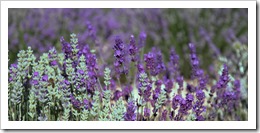 Another quality study has emerged using the oral encapsulated lavender essential oil. This randomized, double-blind, placebo-controlled trial investigated two doses of oral lavender essential oil in comparison to a selective serotonin reuptake inhibitor, paroxetine, in patients who have been diagnosed with generalized anxiety disorder (GAD). Individuals were given a lavender essential oil made from the steam-distilled fresh flowering top of lavender that has then been standardized to contain approximately 70% of two constituents, linalool and linalyl acetate. The product was given as either an 80 or 160 mg dose and then 1 placebo or 2 placebo pills daily. The paroxetine was given in capsules of 20 mg. Treatment was given for 10 weeks, and measurements of safety and efficacy were done at 2, 4, 6, 8, and 10 weeks. During a week of "down-titration" following the study, patients who were on the paroxetine, took the treatments every other day to account for any withdrawal problems caused by paroxetine. Patients in the lavender essential oil group took placebo.
Another quality study has emerged using the oral encapsulated lavender essential oil. This randomized, double-blind, placebo-controlled trial investigated two doses of oral lavender essential oil in comparison to a selective serotonin reuptake inhibitor, paroxetine, in patients who have been diagnosed with generalized anxiety disorder (GAD). Individuals were given a lavender essential oil made from the steam-distilled fresh flowering top of lavender that has then been standardized to contain approximately 70% of two constituents, linalool and linalyl acetate. The product was given as either an 80 or 160 mg dose and then 1 placebo or 2 placebo pills daily. The paroxetine was given in capsules of 20 mg. Treatment was given for 10 weeks, and measurements of safety and efficacy were done at 2, 4, 6, 8, and 10 weeks. During a week of "down-titration" following the study, patients who were on the paroxetine, took the treatments every other day to account for any withdrawal problems caused by paroxetine. Patients in the lavender essential oil group took placebo.
A total of 616 patients were recruited and then 536 patients randomized to treatment. These were men and women, between ages 18 and 65 year old, from 57 general practice and psychiatric practices in Germany, who had a diagnosis of moderate to marked severity of GAD for an average of 2.5 years. Psychiatric medications other than the paroxetine were not allowed during the study and for 30 days prior to entering the study. A total of 128 were in the 160 mg Lavender group, 135 in the 80 mg/day group, 137 in the paroxetine group and 136 in the placebo group.
After 4 weeks of the study and at other study time points, the intake of 160 mg/day of lavender essential oil resulted in a significantly greater change in the HAMA (Hamilton Anxiety Scale) score compared to placebo (P< 0.01). After 6 weeks and beyond, those taking the 80 mg/day of lavender essential oil had a significantly greater change in the HAMA scores compared to placebo. At week 6 the HAMA score in those taking paroxetine approached significance but they were not significantly better than placebo after that point.
Significantly more patients in the 160 mg/d lavender group showed an improvement in the HAMA score of 50% or more compared to the placebo group (60.3% vs. 37.8%). This was also observed in the 80 mg/d group (51.9% vs. 37.8%). The HAMA score was < 10 in significantly more of those patients taking the lavender product compared to the placebo (46.3% vs. 29.6%). All three treatment groups, the 80 mg/day, 160 mg/day and the paroxetine contained a greater percentage of patients who were "much/very much improved" or had a "moderate/marked" therapeutic effect as compared to the placebo group. The adverse events that were reported were 25% of those in the 160 mg/day lavender group, oddly higher of 34.8% in the 80 mg/day group, 40.9% in the paroxetine group and 30.9% in the placebo group. These adverse events were reported as gastrointestinal disorders, infections, and nervous system problems.
Commentary: Both doses of oral essential oil of lavender were effective in treating GAD and were more effective than the conventional medicine, paroxetine. In terms of adverse events, those taking lavender were similar to placebo and lower than paroxetine. This study is another welcomed positive study in using an oral lavender essential oil standardized to linalool and linalyl acetate in the treatment of GAD. Conventional medications, whether anti-depressants or anxiolytics or barbiturates are fraught with side effects, which makes the lavender essential oil product that much more appealing. That said, there are nonresponders to natural medicine, including this lavender oil and we all must recognize that some individuals will need the conventional medications for anxiety, at least until other efforts are made in assessing the complexities of causation and then addressing those.
Reference
Kasper S, Gastpar M, Müller WE, et al. Silexan is effective in generalized anxiety disorder – a randomized, double-blind comparison to placebo and paroxetine. Int J Neuropsychopharmacol. January 23, 2014:1-11. [epub ahead of print]. doi: 10.1017/S1461145714000017.

